New PM Carney unveils his election cabinet, cutting team to 23 ministers
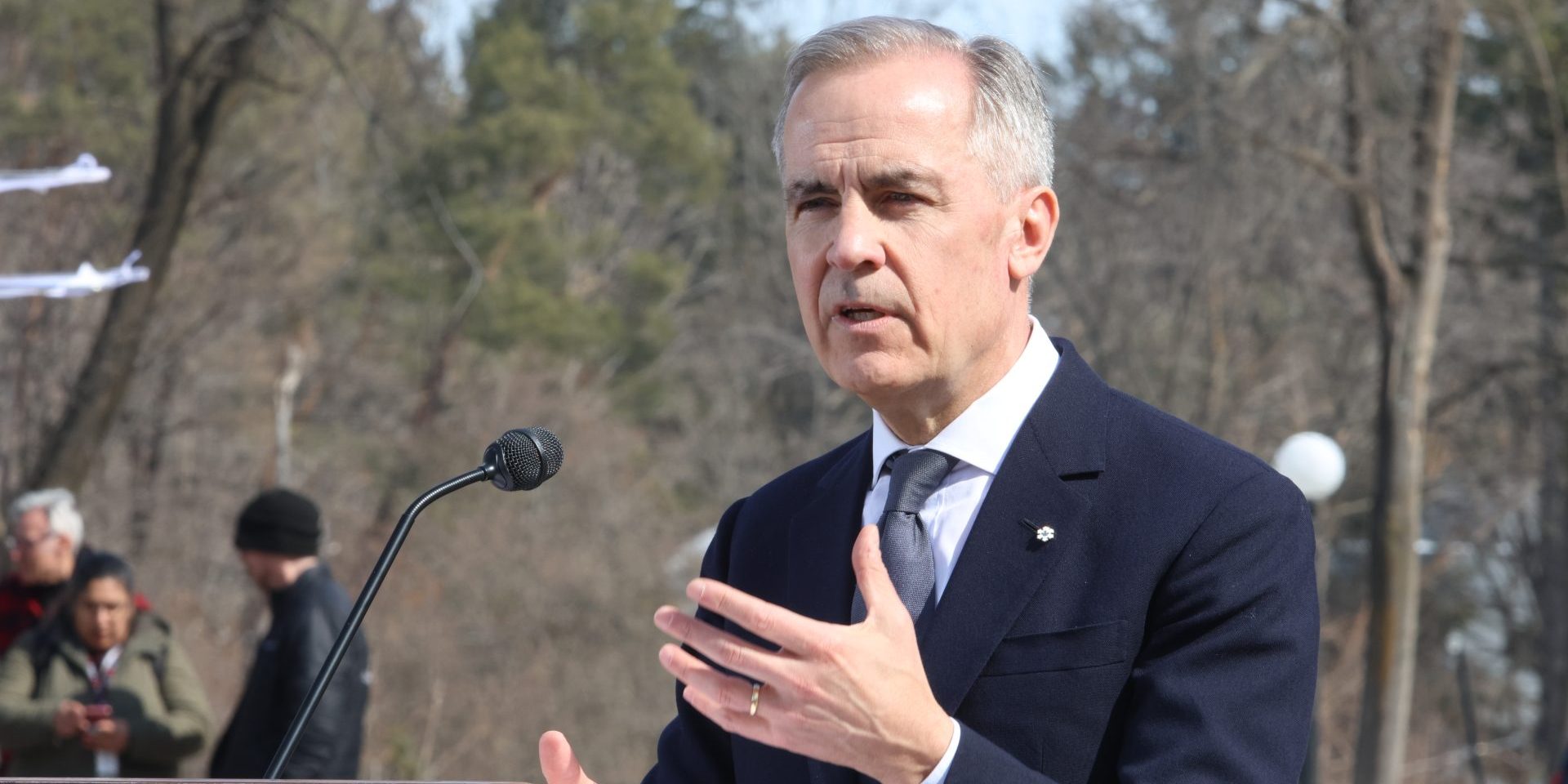
Prime Minister Mark Carney tapped 23 ministers to his first cabinet that will take him into the coming election, keeping Trudeau-era heavyweights handling the Canada-U.S. file, but cutting a dozen cabinet roles and shuffling out 17 MPs from the senior team.
On March 14, the newly elected Liberal leader was sworn in as the 24th prime minister of Canada by Governor General Mary Simon, succeeding MP Justin Trudeau (Papineau, Que.), who announced his resignation just over two months ago.
In a scrum following the ceremony, Carney said his “leaner cabinet” will be “action oriented” and focus on two priorities: protecting Canadian workers, and “growing this great country.”
The smaller team represents a much smaller group than the 36 who most recently served in cabinet, or the 30 ministers tapped in Trudeau’s first cabinet named in 2015.
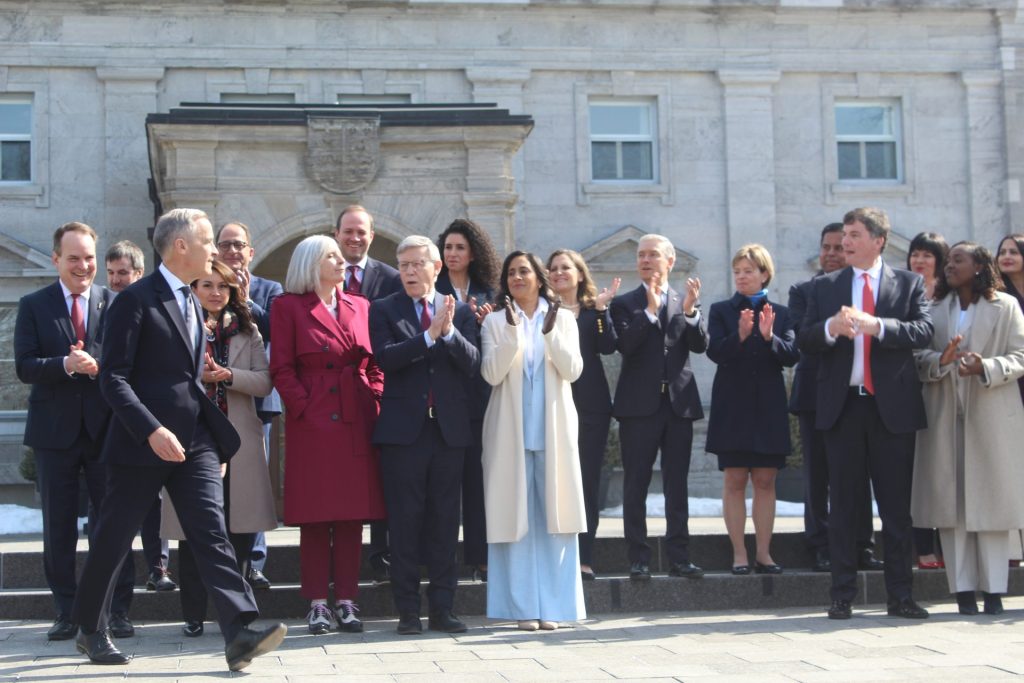
While Trudeau had been criticized for the growth in size of his cabinet, he followed in a pattern of ministerial expansion dating back decades, including his predecessor, former Conservative prime minister Stephen Harper, whose final cabinet grew to 39 from the 25 he named in his first cabinet after forming government in 2006.
In his five-minute introductory remarks, Carney hinted at the contrast his Liberal team will attempt to present Canadians on the campaign trail.
“We will relentlessly pursue this positive agenda because Canadians know that negativity isn’t strength,” Carney said. “We know that negativity won’t pay the rent or the mortgage, that negativity won’t bring down the price of groceries. Negativity won’t win a trade war.”
In his March 9 victory speech, Carney promised “big change,” saying his tenure as leader and prime minister wouldn’t be “business as usual,” and on March 14 he said his team represents “new ministers with new ideas.” Despite a slimmed down cabinet, he only named three new MP’s to his cabinet.
While Carney promised “big change” and a tenure as leader and prime minister that wouldn’t be “business as usual” in his victory speech last week, despite a slimmed down cabinet, he only named three new MPs to his cabinet.
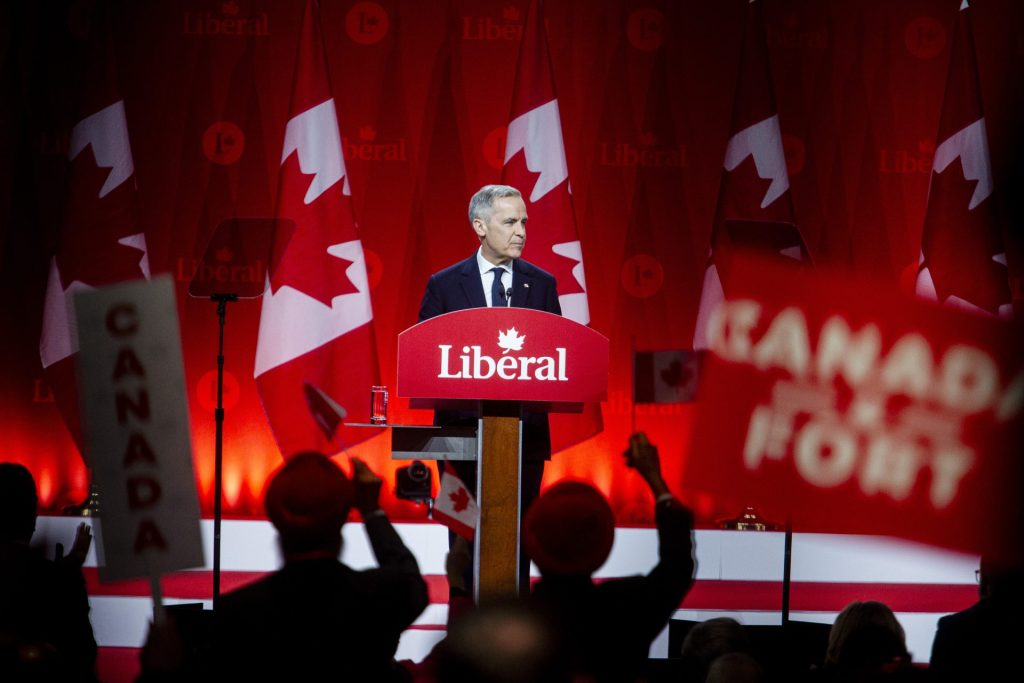
The only new additions were Kody Blois (Kings-Hants, N.S.) as minister of agriculture and agri-food and rural economic development—overseeing roles previously held by two ministers—new Government House Leader Arielle Kayabaga (London West, Ont.), and Ali Ehsassi (Willowdale, Ont.) as minister of transformation, public services and procurement. All the other ministers either remained in their previous roles, were shuffled to new ones, or had previously served as ministers under Trudeau.
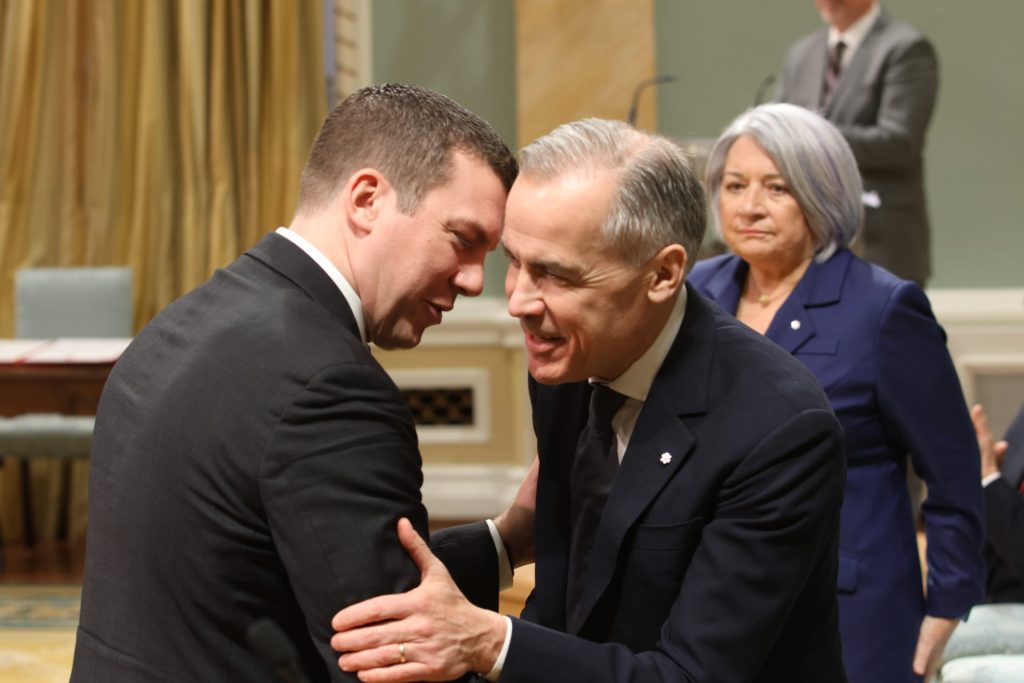
Kayabaga, who was recently parliamentary secretary to the small business minister, will also serve as democratic institutions minister. Ehsassi, meanwhile, previously served as parliamentary secretary to the Innovation minister from December 2019 to August 2021.
Prime Minister Carney and his new ministers took their oath of office at Rideau Hall, just under a week after his landslide victory in the Liberal Party leadership contest on March 9, where the newly elected leader secured over 85 per cent of the vote.
Trudeau-era ministers in key roles
Four of the key ministers stickhandling Canada’s fraught relationship with the United States have remained in cabinet, but with their roles shifted.
François-Philippe Champagne (Saint-Maurice-Champlain, Que.) is taking over as finance minister. He’s out as innovation, science, and industry minister, a role he has held since January 2021. Outgoing Transport Minister Antia Anand (Oakville, Ont.) takes on that large portfolio.
Dominic LeBlanc (Beauséjour, N.B.), who joined Trudeau in November to dine with Donald Trump just days after Trump was elected U.S. president, is taking on an even greater U.S.-facing role in trade. After only a couple months as finance minister, LeBlanc has dropped the role and now becomes Minister of International Trade while retaining the intergovernmental affairs file.
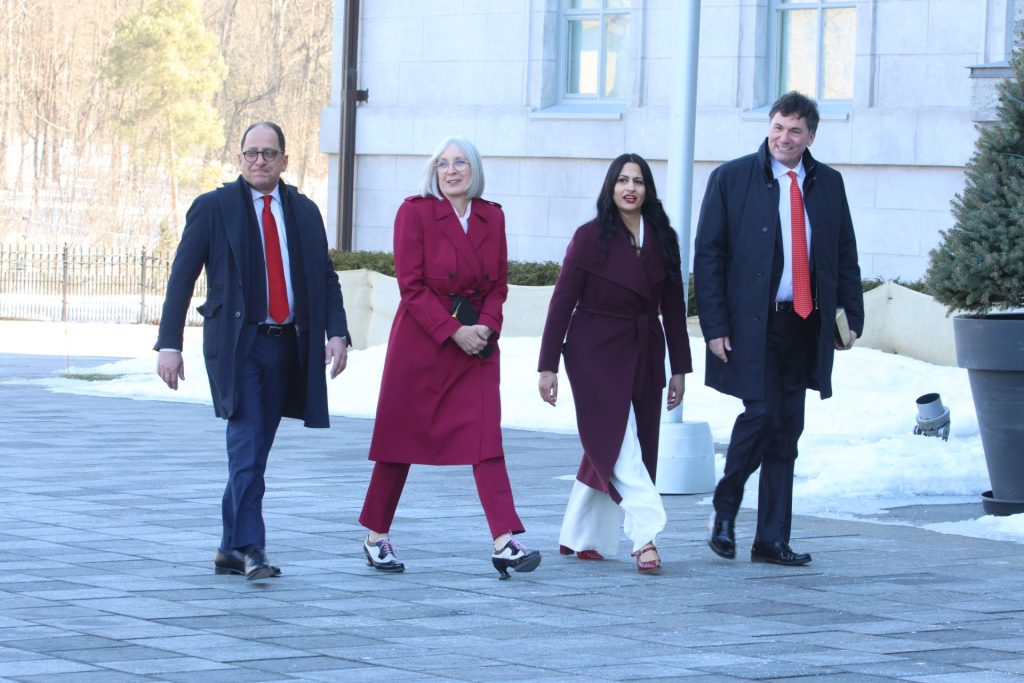
Foreign Affairs Minister Mélanie Joly (Ahuntsic-Cartierville, Que.) is staying in her highly-visible role, and tackling international development, too, but was unable to attend the shuffle as she closes a three-day G7 foreign ministers meeting in Charlevoix, Que. with a press conference earlier in the morning.
Public Safety Minister David McGuinty (Ottawa South, Ont.), who recently joined cabinet in Trudeau’s Dec. 20 shuffle, is staying in the role as Trump ramps up his rhetoric on Canada-U.S. border issues.
Defence Minister Bill Blair (Scarborough Southwest, Ont.), Treasury Board President Ginette Petitpas Taylor (Moncton—Riverview—Dieppe, N.B.), Minister of Energy and Natural Resources Jonathan Wilkinson (North Vancouver, B.C.) and Indigenous Services Patti Hajdu (Thunder Bay—Superior North, Ont.) are among the few keeping their exact files, and not adding any more responsibilities.
Carney’s top rival in the leadership competition, Chrystia Freeland (University–Rosedale, Ont.), the former deputy prime minister and finance minister, has been given the transport and internal trade portfolios. In contrast, the second runner-up, former government House leader Karina Gould (Burlington, Ont.), did not get a spot in cabinet. Carney, who amassed more than 70 MP endorsements during the leadership race, opted against appointing any caucus member or former minister who had endorsed either of his leadership rivals.
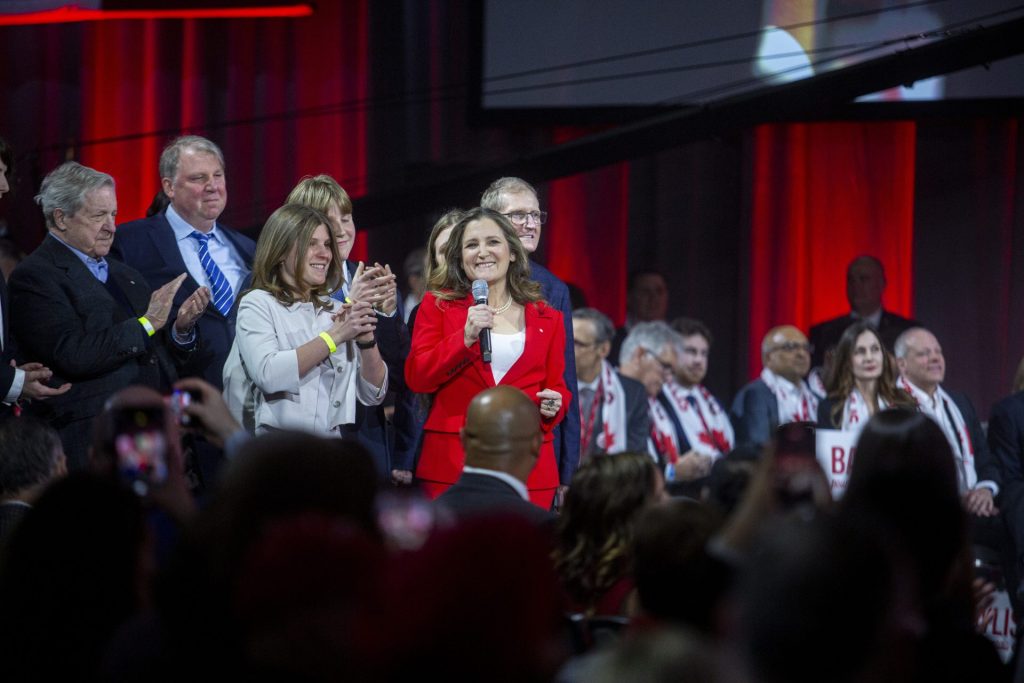
Who’s in and who’s out?
Even as Carney shuffled out many in Trudeau’s team, the newly-formed cabinet retains many familiar faces, and falls just shy of the Trudeau-standard gender-parity with 11 women to 12 men, with Carney making 13. There is no minister from Prince Edward Island, and only two hailing from ridings west of Ontario.
Asked about that duo out of his 23 appointees, Carney responded that representation was “necessarily smaller” given his reduced cabinet, saying he picked a tighter team to focus on “meeting the moment.”
“We have very capable, exceptional members from Western Canada,” but “it’s a factor when you reduce things down,” said Carney before noting he should be counted among their number.
“I’m from the West,” said Carney, who was born in Fort Smith, Northwest Territories, and grew up in Edmonton, Alta.
He also pointed out that Freeland, too, is from Alberta even though she now represents an Ontario riding.
Stephen Guilbeault (Laurier-Sainte Marie, Que.), who has led the environmental file since 2021, will now become minister for Canadian culture and identity—and more crucially, Carney’s new Quebec lieutenant. Terry Duguid (Winnipeg South, Man.) will now become minister of environment and climate change. His previous roles as sport minister and the prairie economic development file, no longer have standalone seats at the cabinet table. Guilbeault is also now responsible for Parks Canada.
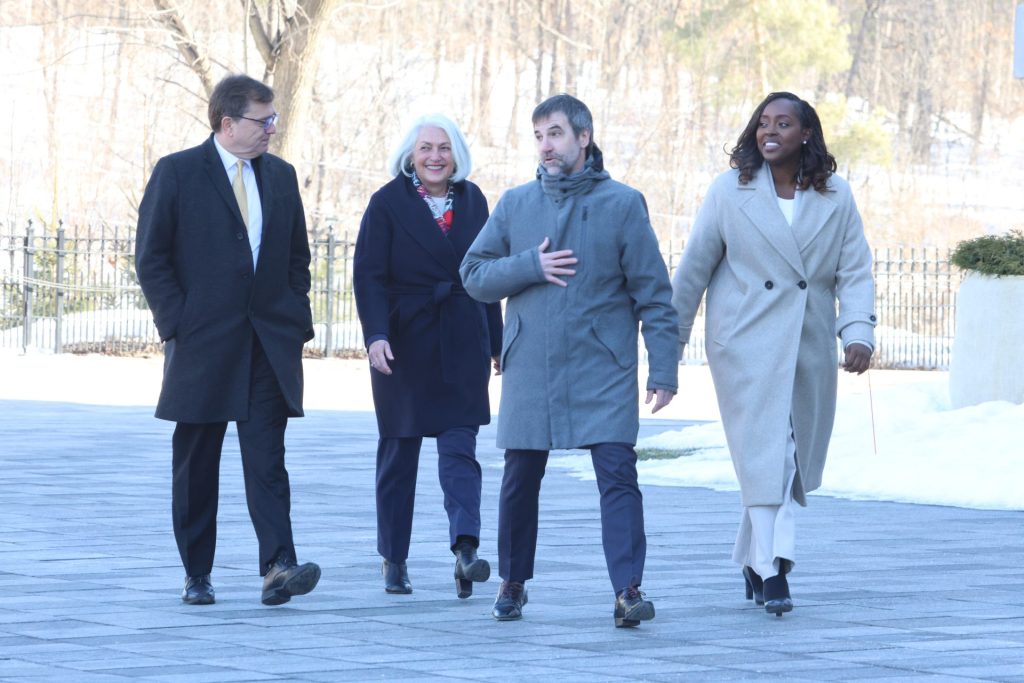
Crown-Indigenous Relations Minister Gary Anandasangaree (Scarborough–Rouge Park, Ont.), who also looks over northern affairs, will take on a much larger role, adding Attorney General and justice minister to his responsibilities.
New Health Minister Kamal Khera (Brampton West) has a major promotion after serving as diversity, inclusion and persons with disabilities minister since July 2023, and seniors minister for nearly two years before that.
Steven MacKinnon (Gatineau, Que.) has been tapped as minister of jobs and families, leaving the employment, workforce development, and labour files.
Rechie Valdez (Mississauga—Streetsville, Ont.) will serve as Carney’s chief government whip.
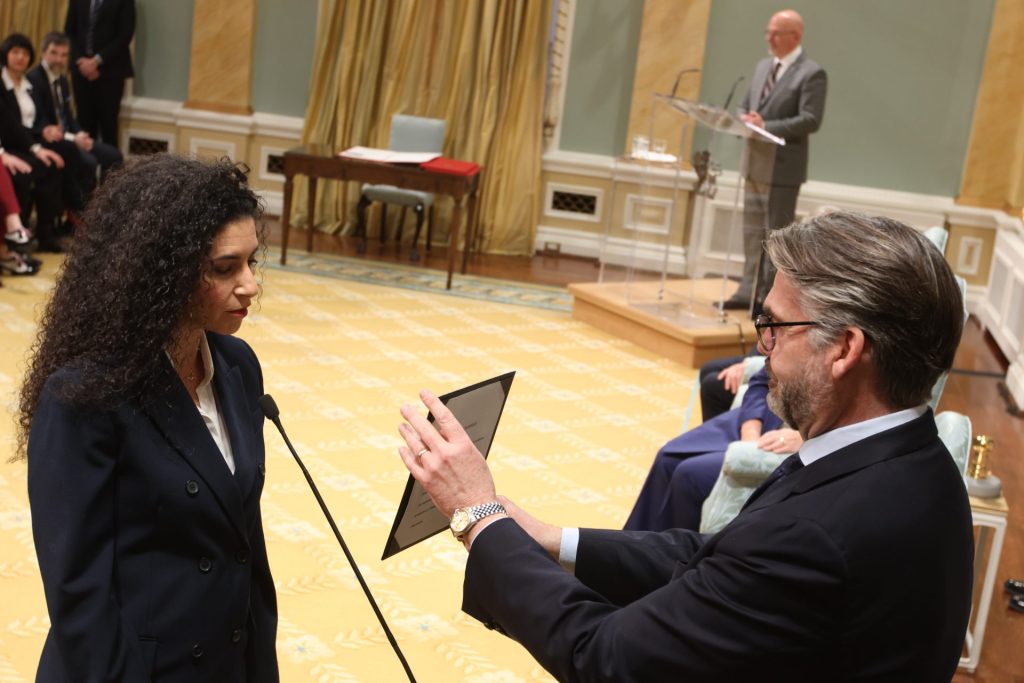
Carney is keeping a few relatively new cabinet ministers, who were first tapped months before by Trudeau in a December shuffle, including new Minister of Immigration, Refugees, and Citizenship Rachel Bendayan (Outremont, Que.). Bendayan became official languages minister and associate minister of public safety just months ago after working in several parliamentary secretary roles since 2019.
Bendayan’s previous role has been eliminated, with none responsible for official languages in Carney’s cabinet. Speaking on that move in French, Carney said that language is “at the centre” of Canada’s identity.
“The question of Canadian identity is much broader than just official languages. It’s much more than our heritage,” he added.
“We are building our identity,” he said, adding it includes nature, noting that one of Guilbeault’s new mandates covers nature, oceans, and biodiversity and ensuring they are protected and promoted.
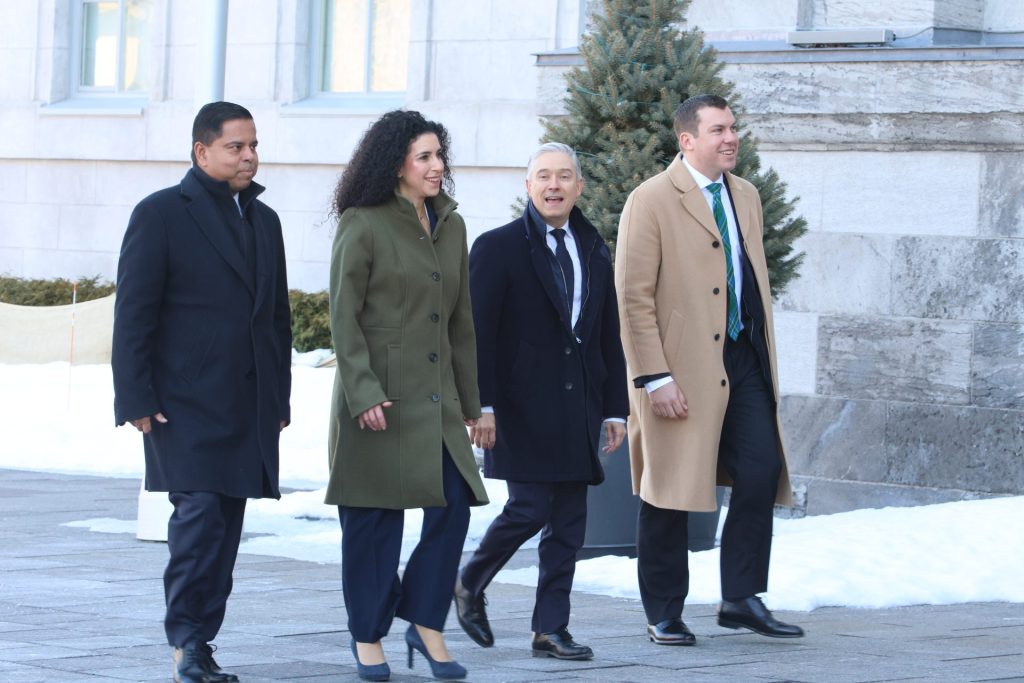
Housing, Infrastructure, and Communities Minister Nate Erskine-Smith (Beaches–East York, Ont.) is keeping his role. Before joining cabinet in December, Erskine-Smith had said he wouldn’t be running in the next election but changed his mind.
Joanne Thompson (St. John’s East, N.L.) is taking on fisheries, oceans, and the Coast Guard. First elected in 2021, Thompson became the new seniors minister in the December shuffle.
Élisabeth Brière (Sherbrooke, Que.) is adding Veterans Affairs to her current responsibilities for national revenue, which have been slightly rebranded as “the minister responsible for the Canada Revenue Agency. Before joining cabinet in December 2024, she served as parliamentary secretary to both the minister of families, children and social development, and to the minister overseeing mental health and addictions.
Trudeau’s former Quebec lieutenant Jean-Yves Duclos (Quebec, Que.), who said in a March 13 statement he plans to run again, has no role in Carney’s cabinet.
Marc Miller (Ville-Marie-Le Sud-Ouest-Île-des-Soeurs, Que), a close friend of Trudeau who once sat in his wedding party, is out of cabinet.
Several ex-cabinet ministers not running again
Several now-former cabinet ministers have previously announced they will not be on the next ballot: Mark Holland (Ajax, Ont.) leaves the health portfolio after announcing on March 13 that he would not run. Pascale St-Onge (Brome-Missisquoi, Que.), who has led the tourism file since February; Arif Virani (Parkdale-High Park, Ont.), formerly justice minister; Mary Ng (Markham-Thornhill, Ont.), who has held variations of the international trade file since November 2019; Harjit Sajjan (Vancouver South, B.C.), who has handled emergency preparedness since July 2023; Gudie Hutchings (Long Range Mountains, N.L.), who oversaw rural economic development since October 2021; and Marci Ien (Toronto Centre, Ont.), whose role has been absorbed by the culture and identity file now under Guilbeault.
The previous week, speculation cast a wide net over who would be included in both Carney’s new cabinet and his candidate roster in the expected snap election.
Senior Liberal sources previously told The Hill Times that former British Columbia premier Christy Clark had been in consideration. Clark had explored a run for party leadership, but opted out of the race, citing her lack of fluency in French. Her decision also came after she faced questions about her brief stint as a member of the Conservative Party, which she erroneously denied in an interview with the CBC.
In a text message to The Hill Times last week, Clark said she had not decided whether to run in the next federal election. However, she also said she was “keen to help elect as many Liberals” as possible and that seeking her own seat “is one possible way to do that.”
Liberal sources also confirmed previous reporting by CBC/Radio-Canada that Carney’s team had approached former Quebec premier Jean Charest, but he declined an offer to join, and it remains unclear what specific position was offered.
Polling aggregator 338Canada currently places the Liberals six points behind the Conservatives, with 33 per cent and 39 per cent polling averages, respectively. That represents a 13-point reduction in the polling deficit since Jan. 5, when the now-former prime minister announced his intent to resign, when the Conservatives were polling at 45 per cent, compared to the Liberals 20 per cent, just one point above the NDP, now polling at 14 per cent.
Liberal sources told The Hill Times that the next election is expected to be called before the House returns on March 24, meaning voters are likely headed to the polls in late April or early May.
The Hill Times
—with files from Samantha Wright Allen
Carney’s new cabinet
- Minister of International Trade and Intergovernmental Affairs Dominic LeBlanc (Beauséjour, N.B.)
- Minister of Foreign Affairs and International Development Mélanie Joly (Ahuntsic-Cartierville, Que.)
- Minister of Finance François-Philippe Champagne (Saint-Maurice–Champlain, Que.)
- Innovation, Science and Industry Minister Anita Anand (Oakville, Ont.)
- National Defence Minister Bill Blair (Scarborough-Southwest, Ont.)
- Indigenous Services Minister Patty Hajdu (Thunder Bay-Superior North, Ont.)
- Energy and Natural Resources Minister Jonathan Wilkinson (North Vancouver, B.C.)
- Treasury Board President Ginette Petitpas Taylor (Moncton-Riverview-Dieppe, N.B.)
- Minister of Canadian Culture and Identity, Parks Canada, Steven Guilbeault (Laurier-Sainte-Marie, Que.)
- Minister of Transport and Internal Trade Chrystia Freeland (University-Rosedale, Ont.)
- Minister of Health Kamal Khera (Brampton West, Ont.)
- Justice Minister and Attorney General, and Minister responsible for Crown-Indigenous Relations and Northern Affairs Gary Anandasangaree (Scarborough—Rouge Park, Ont.)
- Chief Government Whip Rechie Valdez (Mississauga-Streetsville, Ont.)
- Minister of Jobs and Families Steven MacKinnon (Gatineau, Que.)
- Minister of Public Safety and Emergency Preparedness David McGuinty (Ottawa South, Ont.)
- Environment and Climate Change Minister Terry Duguid (Winnipeg South, Man.)
- Minister of Housing, Infrastructure and Communities Nathaniel Erskine-Smith (Beaches-East York, Ont.)
- Immigration, Refugees and Citizenship Minister Rachel Bendayan (Outremont, Que.)
- Minister of Veterans Affairs and Minister responsible for the Canada Revenue Agency Élisabeth Brière (Sherbrooke, Que.)
- Minister of Fisheries, Oceans and the Canadian Coast Guard Joanne Thompson (St. John’s East, N.L.)
- Leader of the Government in the House of Commons and Minister of Democratic Institutions Arielle Kayabaga (London West, Ont.)
- Agriculture and Agri-food Minister Kody Blois (Kings–Hants, N.S.)
- Minister of Government Transformation, Public Services and Procurement Ali Ehsassi (Willowdale, Ont.)






 LICENSING
LICENSING PODCAST
PODCAST ALERTS
ALERTS













